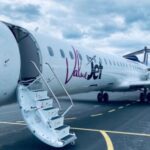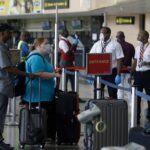
The main objective of passenger’s facilitation is to make the traveller meet all conditions required to enable him or her travel with a particular flight and also to board on time, as scheduled by the airline.
That process has become rigorous in every part of the world due to security threat. So it is not only that the airline, the handling company and the airport management would ensure that the passenger boards his flight, but care is taken to ensure that he did not board the flight with incendiary devices and other prohibited instruments or goods.
This is a global response to terrorism, including hijackers who might access the aircraft with dangerous weapons if not checkmated during facilitation.
Air travel is a sensitive means of transport because top business moguls, entrepreneurs, government officials, international diplomats and others travel by air. For these travellers to be safe, security operatives make sure that every passenger is scrutinized within short possible time.
According to the International Air Transport Association (IATA), many countries require Advance Passenger Information (API) before the flight bringing them to the country lands at their destination “Over 90 countries now require airlines to send API before the flight’s arrival. More countries are planning to introduce similar requirements in the near future. API information usually consists of data found in the Machine Readable Zone (MRZ) of passports and other travel documents (full name, date or birth, gender, passport number, country of citizenship, country of passport issuance).
However, some countries require information that cannot be machine-read. IATA’s aim is to ensure that all countries requiring API-type data harmonize their requirements with global standards and guidelines,” IATA stated.
In a resent presentation at the Aviation Round Table (ART) breakfast meeting in Lagos, aviation security expert, Dr. Ayodele Obilana, spoke on passenger facilitation in the aviation security regime, where he stated that facilitation and security operational process in International Civil Aviation settings are explicitly enshrined in the Annexes to the Conventions of International Civil Aviation Organization (ICAO)
Annex 9, which covers facilitation and Annex 17 that deal with security programmes respectively with their proprietary working documents which provide guidelines for implementation of the global processes involved in airports facilitation and security programmes.
“Virtually all ICAO member States of which Nigeria is one, do pattern their procedures after ICAO Annexes and are encouraged to develop their operational programmes/documents in accordance with their national laws and regulations; hence NCAA Civil Aviation Acts / Regulations in place,” he said.
Obilana explained that the focus and objective of civil aviation facilitation and security is to ensure seamless safe passage and free flow of passenger, their luggage and cargo, through airport facilities following established global procedure.
“The process is expected to adequately have in place uncompromised layers of security coverage in all ramifications. It is an all-time airport process during normal or favourable periods, as well as adverse periods especially during occurrence of flight disruption or delay.
“From airline operational perspective, the process involved in airport facilitation takes cognizance of acceptable International Standards and practices with recourse to the following among others: timely departure and arrival of airlines; fast and efficient Immigration/customs/health protocols: reduction and or elimination of airport congestion; use of technology for the process as much as possible and support; seamless passage for physically challenged passengers, transit passenger, VIP (security) and their luggage and provision of Infrastructural facilities for enhanced processing as well as efficient and safe delivery of passenger(s) luggage,” he said.
Obilana stated that Operational process for seamless airport passage calls for ‘balancing act’ between facilitation and security procedures, adding that one is not to override the other.
“Accordingly, the security regime should also ensure coordination and cooperation between airport agencies and the tasking authority who are statutorily assigned for implementation of the process in all facets. The process of facilitation must also ensure that security layers are not compromised in the process in itself.





